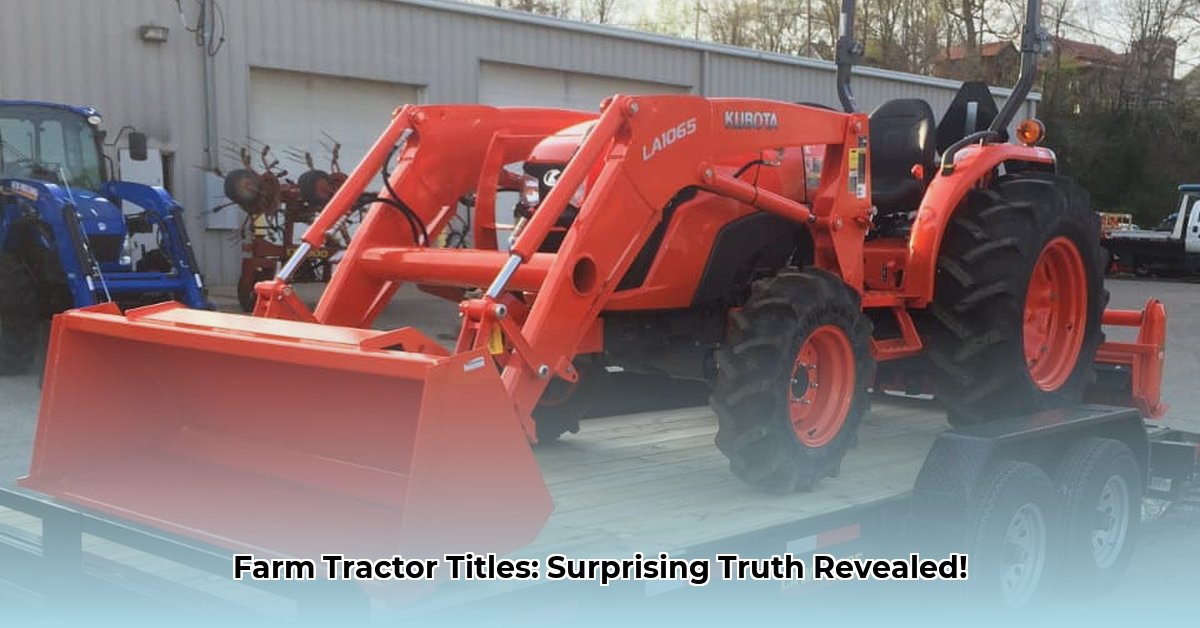
Understanding the Complexities of Farm Tractor Ownership
Owning a farm tractor represents a significant investment. Unlike cars, however, there's no universal system for titling farm tractors in the United States. This lack of standardization creates confusion and potential legal headaches for farmers. This guide provides clear, actionable steps to protect your investment and navigate the complexities of farm tractor ownership.
State-by-State Tractor Title Rules: A Patchwork of Laws
The biggest hurdle in farm tractor ownership is the inconsistent state regulations. Some states require titles, others don't; some states have specific criteria based on tractor size or usage (commercial vs. agricultural). This necessitates checking your specific state's Department of Motor Vehicles (DMV) or equivalent agency for the most up-to-date information. A quick online search for "[Your State] farm tractor registration" will usually lead you to the correct agency.
Example State Regulations (Illustrative – Check Your State):
| State | Titling Requirements | On-Road Registration Requirements |
|---|---|---|
| Iowa | Generally not required | Required for road use |
| Texas | Generally not required | Often depends on classification as farm equipment |
| California | May be required, depending on the tractor | Required for road use |
| Nebraska | Generally not required | Road use registration may apply |
Did you know that the variation in state regulations often leads to disputes during resale?
Establishing and Proving Ownership: Building Your Case
Since titling isn't always mandatory, meticulously documenting ownership is crucial. Think of this as building an irrefutable case, should you ever need to prove ownership.
Step-by-Step Guide to Documenting Ownership:
- Gather Purchase Documentation: Preserve all purchase records: invoice, receipt, warranty, and even photos of the tractor. This forms the core of your ownership evidence.
- Record the Serial Number: The serial number is your tractor's unique identifier. Record it meticulously in all your documents; take photos, and keep a separate record in a secure location. Have you recorded your tractor's serial number in multiple secure places?
- Manufacturer's Certificate of Origin (MCO): If available, the MCO is strong evidence of initial ownership. Treat this document with the utmost care.
- Secure Storage (Physical & Digital): Store documents in a fireproof safe and create digital backups using secure cloud storage. This redundancy protects you against loss or damage.
Transferring Ownership: A Smooth and Legal Transition
Selling or gifting a tractor requires careful adherence to legal processes. This ensures a smooth transition and prevents future disputes.
Checklist for Transferring Ownership:
- Detailed Bill of Sale: Create a comprehensive bill of sale including: tractor description (make, model, serial number), purchase price, date of sale, buyer and seller information, and signatures. Has your bill of sale included all relevant information?
- Transfer of Documents: Provide the new owner with all relevant documentation—this includes the original purchase documents, proof of registration (if applicable), and the bill of sale.
- Comply with State Regulations: Understand and adhere to your state's specific procedures regarding the transfer of ownership. This may involve notifying the DMV or other relevant agencies.
Theft Prevention: Protecting Your Valuable Investment
Farm equipment theft is a serious problem. Implementing preventative measures can significantly reduce your risk.
Actionable Tips to Prevent Tractor Theft:
- Secure Storage: Keep your tractor in a locked, secure building or area, ideally hidden from view.
- GPS Tracking: Consider installing a GPS tracking device for easy location if stolen. This can significantly aid in recovery.
- Alarm Systems: Investing in a theft alarm system adds an extra layer of deterrence.
- Immediate Reporting: Report any suspected theft to local law enforcement immediately. Timely reporting significantly increases the chances of recovery.
On-Road Usage & Registration: Navigating Legal Requirements
Many states require registration for tractors used on public roads. Failure to comply may result in fines. Check your state's DMV website or contact your local authorities for specific requirements. Are you aware of your state's on-road usage regulations?
Optional Titling: Weighing the Benefits
Even if not mandatory in your state, consider optional titling. This provides extra protection and simplification during resale.
Benefits of Optional Titling:
- Clear proof of ownership, reducing potential disputes.
- Streamlined resale process.
- Enhanced protection against theft or fraudulent claims.
Advocacy and Future Considerations: Working Towards Better Regulations
Farmers should actively participate in advocating for clearer and more consistent national standards for tractor ownership documentation. Contact your state representatives and agricultural organizations to voice your concerns and promote improved regulations.
Conclusion: Taking Action Now
The lack of standardized titling for farm tractors creates vulnerabilities. By strictly adhering to the guidelines outlined in this guide, you can strengthen your ownership claim, ensure smooth transfers, and protect your significant investment against theft. Review your tractor's documentation today.